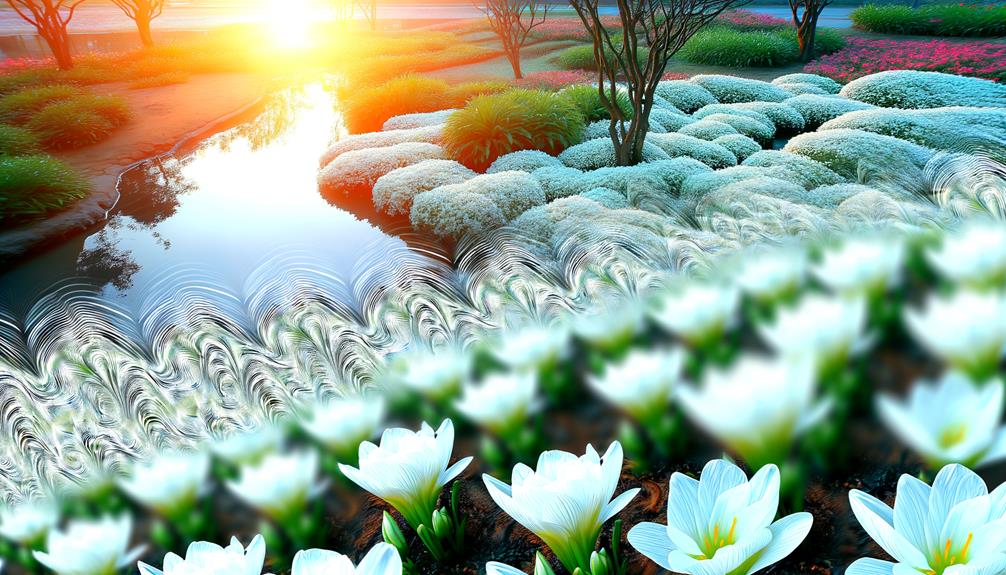Zahra Name Meaning in English
The name 'Zahra' derives from the Arabic verb 'zahara,' meaning 'to shine' or 'to blossom.' Its linguistic roots convey images of flourishing and brilliance, resonating with themes of purity and beauty across cultures. In Persian contexts, it connotes brightness and splendor, while in African cultures, it symbolizes resilience and grace.
The name's global appeal varies, with high popularity in the Middle East and North Africa, moderate presence in Europe, and growing familiarity in North America. Esteemed namesakes like Zahra Rahnavard and Zahra Lari have further enhanced its prominence.
There are layers of significance yet to uncover.

Key Takeaways
- The name 'Zahra' means 'to shine' or 'to blossom' in Arabic.
- 'Zahra' symbolizes purity, beauty, and brilliance.
- The name carries cultural significance in the Middle East, Persia, and Africa.
- 'Zahra' evokes imagery of blooming flowers and natural elegance.
- It is popular in the Middle East and North Africa, with moderate usage elsewhere.
Origin and Etymology
The name 'Zahra' originates from Arabic, where it is derived from the root word 'zahara,' meaning 'to shine' or 'to blossom.' This etymological foundation underscores the name's association with radiance and growth.
In linguistic terms, the root 'zahara' conveys a sense of flourishing and brilliance, which is emblematic of the qualities often attributed to individuals bearing this name.
The morphological structure of 'Zahra' adheres to typical patterns found in Arabic nomenclature, where the root conveys the primary semantic value, while the form imbues it with personal identity.
Such etymological roots not only influence the name's phonetic properties but also its semantic resonance, making 'Zahra' a name rich in linguistic heritage and significance.
Cultural Significance
Building on its rich etymological foundation, the name 'Zahra' carries profound cultural significance across various regions and communities. In the Arab world, 'Zahra' is often linked to purity and beauty, resonating deeply in Islamic traditions. In Persian culture, it is associated with brightness and splendor, reflecting the high value placed on aesthetics. Moreover, 'Zahra' appears in various forms across African cultures, symbolizing resilience and grace.
| Region | Cultural Connection | Interpretation |
|---|---|---|
| Arab World | Islamic Traditions | Purity and Beauty |
| Persian Culture | Aesthetic Values | Brightness and Splendor |
| African Cultures | Symbolic Resonance | Resilience and Grace |
This multi-faceted significance underlines 'Zahra' as a name imbued with rich cultural layers and meanings.
Symbolism and Imagery
In various cultural contexts, the name 'Zahra' evokes profound symbolism and rich imagery that convey deeper meanings beyond its literal interpretation.
The name Zahra, meaning 'blooming flower' or 'brilliant,' provides a vivid tableau of natural beauty and radiance. This evocative imagery can be broken down into four key elements:
- Floral Emblem: Symbolizing purity, innocence, and renewal.
- Radiance: Connoting brilliance, enlightenment, and illumination.
- Natural Beauty: Evoking the elegance and grace of flourishing flora.
- Life Cycle: Representing growth, transformation, and perpetual renewal.
These elements collectively create a multifaceted image that resonates deeply with cultural archetypes and emotional landscapes, enriching the name 'Zahra' with layers of meaning that transcend mere nomenclature.
Popularity and Usage
Exploring the cultural significance of 'Zahra' naturally leads to an examination of its popularity and contemporary usage across different regions and demographics. The name 'Zahra' has seen varied levels of adoption globally, influenced by cultural, religious, and linguistic factors.
| Region | Popularity Level |
|---|---|
| Middle East | High |
| North Africa | High |
| Europe | Moderate |
| North America | Low to Moderate |
In the Middle East and North Africa, 'Zahra' remains a prevalent choice, often linked to its religious and historical connotations. In contrast, its presence in Western countries like Europe and North America is growing, albeit at a slower pace. This disparity underscores the name's deep-rooted cultural ties and the gradual globalization of naming practices.
Famous Namesakes
Prominent individuals named Zahra have left significant marks in various fields, highlighting the name's widespread cultural resonance. These contributions span diverse domains, reflecting the name's versatility and appeal.
Notable Zahras include:
- Zahra Rahnavard – An influential Iranian artist and political scientist, recognized for her academic and political activism.
- Zahra Lari – The first figure skater from the United Arab Emirates to compete internationally, breaking cultural barriers in sports.
- Zahra Kazemi – An Iranian-Canadian photojournalist known for her courageous work documenting human rights abuses.
- Zahra Nemati – A trailblazing Iranian Paralympic archer, symbolizing resilience and excellence in sports.
These distinguished figures underscore the profound impact individuals named Zahra have made globally, enriching various sectors and inspiring many.
Conclusion
In juxtaposing Zahra's rich etymological roots with its widespread cultural significance, a multifaceted name emerges that transcends both temporal and geographical boundaries.
While its symbolism and imagery evoke notions of beauty and purity, its popularity and usage underscore its enduring appeal across diverse societies.
Additionally, the legacy of famous namesakes further enriches its historical and contemporary resonance.
Consequently, Zahra encapsulates a harmonious blend of tradition and modernity, underscoring the intricate interplay between language, culture, and identity.






